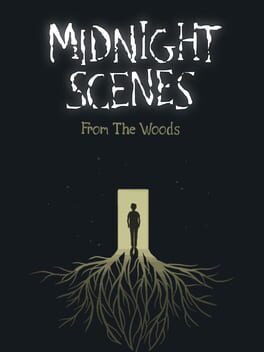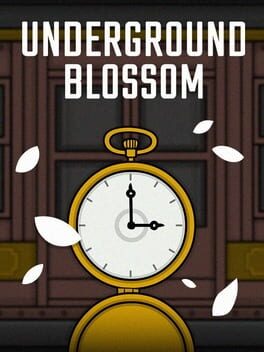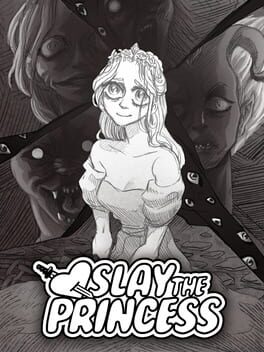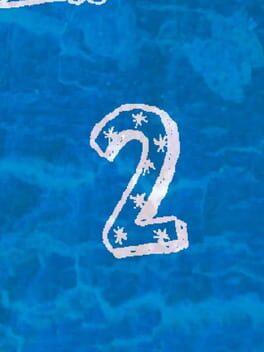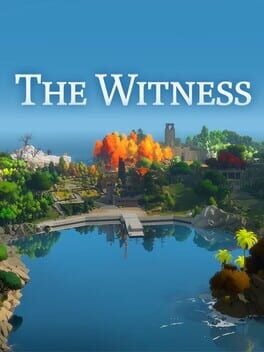aetataureate
5 reviews liked by aetataureate
A diferencia de otros Midnight Scenes, este es algo más narrativo. Creo que resulta refrescante dentro de la serie, que se aleja del point and click para una aventura más centrada en contarte una historia. Me ha recordado un poco al rollo que tienen las historias de adolescentes que escribe Stephen King, un poco Carrie y un poco Stand by me.
Underground Blossom
2023
Underground Blossom: how many layers of ARG are you on
The White Door: like, maybe 5, or 6 right now, my dude
Underground Blossom: you are like a little baby. WATCH THIS.
The White Door: like, maybe 5, or 6 right now, my dude
Underground Blossom: you are like a little baby. WATCH THIS.
Slay the Princess
2023
I took a week after 100%ing the game to think about it, and in retrospect, I'm more disappointed with it than I was at first.
There's a very unfortunate tendency in game writing that seems to pop up when a game wants to be "about" some Big Idea. Almost every time that Big Idea is some variation of existentialism, "we make our own meaning," so on and so forth. This tendency is to start reading Stanford Encyclopedia of Philosophy articles at you, couched in very poorly written original prose. There are, I think, a few obvious problems with this.
First and foremost is that a well-written game very rarely has to tell you what it is About. This is one of the reasons I actually think I enjoyed the demo a lot more -- the general idea that our actions literally changed who the princess was and how we perceived her and that reality was a mutually created spiral was already obvious without a single word being written about it. Unfortunately, it seems like the creators didn't really trust that audiences would Get It, and thus they leaned much deeper into the explicit conceptual stuff in the full game. The full game is so bloated with the internal cosmology that it seems to have no room to actually substantially explore anything.
Secondly: Listen, no disrespect, but laymen (I am one of these!) trying to explain philosophy at you pretty much always goes poorly. To communicate your Big Idea well, you need to be internally precise and clear about what your Big Idea is, and know how to put that precision and clarity into words. If all you can really accomplish is a string of mixed metaphors that vaguely hand-wave towards an idea, it does make me question if you even knew exactly what you wanted to say. I don't think this game really did -- some sort of mashup between "you make your own meaning" and "change is inevitable" and "you experience the world and yourself through other people," all of which are generally very broad and potent ideas that have been explored a ton through various works, and none of which this game really seemed to explore beyond a surface level of just Informing You Of The Idea. It's a very Nier: Automata approach to Big Ideas.
Finally, maybe a bit of a personal gripe, but I don't even think that the "reading an SEP article at the player" approach is necessarily bad. I'm open to the idea, but if you're gonna do it, I'd at least like the article you read at me to be a little more novel? Hit me with some weird-ass niche stuff that I'd struggle to read and make it more interesting! Be a weird little guy that explores weird little ideas and pelt me with that shit! I love learning about new stuff. I think it's inherently interesting. But dear god I cannot stand having games just tell me "hey! listen! did you know... we make our own meaning?" on repeat. I got it! I understand!
All that said: I don't think Slay the Princess is bad. I liked the voice acting a lot, the art was neat, the writing was (at first) a less insufferable and more clever version of the Stanley Parable kind of writing, and generally I'm always excited for new things from this dev team. Scarlet Hollow is one of my favorite VNs, it's just excellent on all fronts and I always highly recommend it! It's just too bad that this game got deeply caught up in a poorly crafted conceptual structure rather than leaning into the strengths of this dev team (very good character writing and slow burn spooky vibes).
It could have been a lot worse. They could have named a giant robot Nietzsche. Thank god there aren't any games that do that.
There's a very unfortunate tendency in game writing that seems to pop up when a game wants to be "about" some Big Idea. Almost every time that Big Idea is some variation of existentialism, "we make our own meaning," so on and so forth. This tendency is to start reading Stanford Encyclopedia of Philosophy articles at you, couched in very poorly written original prose. There are, I think, a few obvious problems with this.
First and foremost is that a well-written game very rarely has to tell you what it is About. This is one of the reasons I actually think I enjoyed the demo a lot more -- the general idea that our actions literally changed who the princess was and how we perceived her and that reality was a mutually created spiral was already obvious without a single word being written about it. Unfortunately, it seems like the creators didn't really trust that audiences would Get It, and thus they leaned much deeper into the explicit conceptual stuff in the full game. The full game is so bloated with the internal cosmology that it seems to have no room to actually substantially explore anything.
Secondly: Listen, no disrespect, but laymen (I am one of these!) trying to explain philosophy at you pretty much always goes poorly. To communicate your Big Idea well, you need to be internally precise and clear about what your Big Idea is, and know how to put that precision and clarity into words. If all you can really accomplish is a string of mixed metaphors that vaguely hand-wave towards an idea, it does make me question if you even knew exactly what you wanted to say. I don't think this game really did -- some sort of mashup between "you make your own meaning" and "change is inevitable" and "you experience the world and yourself through other people," all of which are generally very broad and potent ideas that have been explored a ton through various works, and none of which this game really seemed to explore beyond a surface level of just Informing You Of The Idea. It's a very Nier: Automata approach to Big Ideas.
Finally, maybe a bit of a personal gripe, but I don't even think that the "reading an SEP article at the player" approach is necessarily bad. I'm open to the idea, but if you're gonna do it, I'd at least like the article you read at me to be a little more novel? Hit me with some weird-ass niche stuff that I'd struggle to read and make it more interesting! Be a weird little guy that explores weird little ideas and pelt me with that shit! I love learning about new stuff. I think it's inherently interesting. But dear god I cannot stand having games just tell me "hey! listen! did you know... we make our own meaning?" on repeat. I got it! I understand!
All that said: I don't think Slay the Princess is bad. I liked the voice acting a lot, the art was neat, the writing was (at first) a less insufferable and more clever version of the Stanley Parable kind of writing, and generally I'm always excited for new things from this dev team. Scarlet Hollow is one of my favorite VNs, it's just excellent on all fronts and I always highly recommend it! It's just too bad that this game got deeply caught up in a poorly crafted conceptual structure rather than leaning into the strengths of this dev team (very good character writing and slow burn spooky vibes).
It could have been a lot worse. They could have named a giant robot Nietzsche. Thank god there aren't any games that do that.
2
2014
The Witness
2016
The Witness. Been sitting with this one for a while, trying to think about how best to tear it a new one. I think I'm finally ready to collect my thoughts in a review.
The Witness is aimless, purpose-devoid postmodernism. It takes the worst aspect of that era's fiction - its tendency to navel-gaze - to a new extreme.
If you have seen the ending (which I will not spoil, but will nonetheless warn you about), you know that this game holds no deeper meaning. The brunt of its intended message is: "Woah, isn't it weird how this video game absorbed you so much? WoaaaahhhH the way the human brain learns is SO COOL, line puzzles are everywhere now!" Except they aren't. Their importance starts and ends with the playtime of this game. It is not useful to you to learn how to navigate the complex rule set of these puzzles in your real life; learning them is a time bandit, nothing more.
The Witness is one thing: Line puzzles. Both gameplay-wise AND narratively, that is all it is. And that is the long and short of it.
The worst part, however, is that it tries - and succeeds! - in convincing you it is about more than just itself for the majority of its 20 to 40 hours. Quotation is abundant in The Witness: Audio diaries, movie and documentary clips; all of it feels like it's pointing to something deeper going on under the surface that is simply not there.
Lastly, I want to touch upon Johnathan Blownathon's blind spots in design that he fails to interrogate or amend: Accessibility design in The Witness is at an all-time fucking low. A lot of puzzles basically say "FUCK the hard-of-hearing LMAO", and basically all puzzles fail to account for colour blindness, or even offer an optional colour-blindness mode. Also, the FPS mechanics in this game make you motion sick incredibly quickly, which is an issue I really thought games at large had solved by this point in non-VR titles.
I 100%ed the Witness back in 2017, when I was at my most suicidally depressed. Its sound design, and environmental design are good; I have to give it that. It provided a steady and, at that point, needed dopamine drip-feed that kept me going for a while. I'm also grateful to it for introducing me to a myriad of more interesting media than itself, such as Andrey Tarkovsky's filmography and Italo Calvino's "The Invisible Cities". But that's where my praise wanes.
In the end, finishing The Witness is like eating handfuls upon handfuls of junk food with an intricately beautiful, "really-makes-you-think" art piece on the packaging. It's a binge-and-purge game that takes a lot of your time and leaves you with nothing.
3/10.
The Witness is aimless, purpose-devoid postmodernism. It takes the worst aspect of that era's fiction - its tendency to navel-gaze - to a new extreme.
If you have seen the ending (which I will not spoil, but will nonetheless warn you about), you know that this game holds no deeper meaning. The brunt of its intended message is: "Woah, isn't it weird how this video game absorbed you so much? WoaaaahhhH the way the human brain learns is SO COOL, line puzzles are everywhere now!" Except they aren't. Their importance starts and ends with the playtime of this game. It is not useful to you to learn how to navigate the complex rule set of these puzzles in your real life; learning them is a time bandit, nothing more.
The Witness is one thing: Line puzzles. Both gameplay-wise AND narratively, that is all it is. And that is the long and short of it.
The worst part, however, is that it tries - and succeeds! - in convincing you it is about more than just itself for the majority of its 20 to 40 hours. Quotation is abundant in The Witness: Audio diaries, movie and documentary clips; all of it feels like it's pointing to something deeper going on under the surface that is simply not there.
Lastly, I want to touch upon Johnathan Blownathon's blind spots in design that he fails to interrogate or amend: Accessibility design in The Witness is at an all-time fucking low. A lot of puzzles basically say "FUCK the hard-of-hearing LMAO", and basically all puzzles fail to account for colour blindness, or even offer an optional colour-blindness mode. Also, the FPS mechanics in this game make you motion sick incredibly quickly, which is an issue I really thought games at large had solved by this point in non-VR titles.
I 100%ed the Witness back in 2017, when I was at my most suicidally depressed. Its sound design, and environmental design are good; I have to give it that. It provided a steady and, at that point, needed dopamine drip-feed that kept me going for a while. I'm also grateful to it for introducing me to a myriad of more interesting media than itself, such as Andrey Tarkovsky's filmography and Italo Calvino's "The Invisible Cities". But that's where my praise wanes.
In the end, finishing The Witness is like eating handfuls upon handfuls of junk food with an intricately beautiful, "really-makes-you-think" art piece on the packaging. It's a binge-and-purge game that takes a lot of your time and leaves you with nothing.
3/10.
